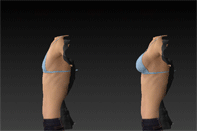Depression is a serious medical illness that affects millions of people throughout the U.S. Treatment usually comes in the form of visiting a psychologist who will talk to the patient, run some tests, and then prescribe therapy, anti-depressants, or a combination of thereof.
However, recent medical studies have shown that Botox can potentially help treat depression and some social anxieties. We’re going to look at what depression is, the current methods used to treat it, and exactly how Botox might be able to help alleviate the symptoms.
What is Depression?
Depression is a mental disorder that negatively affects how people feel, act, and think. It’s characterized by feelings of sadness, loss of hope, and can lead to a loss of interest in activities that the patient used to enjoy.
If left untreated, the condition can cause a wide variety of physical or emotional problems that will take their toll upon a person’s life, relationships, and even work. In some extreme cases, patients who suffer from depression will lose the will to go on with life.
While there are many different types of depression, the World Health Organization has estimated that over 250 million people worldwide suffer from some form of it. Fortunately, depression has been studied for many decades, and scientists have come up with multiple and effective ways of treating it.
How to Treat Depression?
Out of all of the mental disorders, depression is the one that’s the most treatable. Around 80 to 90 percent of those with the condition will eventually respond well to their prescribed treatments.
The key to treating depression is to get diagnosed by a licensed mental health professional. A medical doctor, such as a family practitioner, cannot diagnose depression. They can only rule out medical conditions that might contribute to it.
Before treatment is prescribed, the mental health professional will want to sit down and interview you face-to-face. They will ask questions that will help them come up with a diagnosis. They might even ask that you go back to your medical doctor and get some additional tests performed.
If the mental health professional does diagnose depression, there are several treatment options that they can prescribe at their discretion:
Medications – Scientists think that brain chemistry plays a significant role in depression. Anti-depressants can help alleviate it in some patients. There are many different kinds of medicines on the market—if you tried one ten years ago and it didn’t work, there’s a good chance there’s a new drug on the market that might help.
Therapy – Talk therapy, or psychotherapy, is sometimes used to help treat depression. In some cases, it might be used in conjunction with medications. Psychologists have found that talk therapy to be highly effective in helping treat some forms of depression.
How Can Botox Help Treat Depression?
Botox is a non-invasive cosmetic treatment that’s typically used to smooth out lines and wrinkles on the face. Over the past few years, many medical studies have been performed that show Botox can be used to treat other medical conditions, such as a gummy smile, migraines, and excessive sweating.
Clinical Trials
Recent scientific studies have found that Botox could be an effective treatment for depression. Some people can have a very severe reaction to anti-depressants, or it can cause unintended side effects that can drastically reduce the quality of life.
In 2006, a clinical trial was performed where 30 people were given a series of Botox injections in the facial area. They were diagnosed with symptoms of depression and were already taking anti-depressants. Over the next 16 weeks, ½ of the people were given a Botox injection while the other half received a placebo saline injection.
The participants who received the Botox injection told researchers that they had experienced a 47.1 percent decrease in their depression symptoms six weeks after being injected. Over the next few years, several other studies were performed that seemed to mirror the similar results as the original one.
How Does Botox Treat Depression?
Researchers initially thought that by injecting Botox in areas on the face where frown lines can occur, it would improve the mood of the patient when they look at themselves in the mirror.
However, more recent studies are shifting that line of thinking. Some scientists now believe that facial expressions, such as frowning, can send signals to the brain that indicate a person is unhappy.
By blocking the ability of the muscles to contract with a series of Botox injections, it prevents this part of the face from sending a signal to the brain that the person is depressed—and can result in an improved overall mood.
Botox in Dallas
While researchers are still studying the effect that Botox has upon the overall mood of patients who suffer from depression, it seems as if the results are showing signs of promise.
Even if you don’t suffer from depression, Botox can help smooth out wrinkles and facial lines that you don’t like. If you’re in the Dallas area and would like to speak to an expert about Botox for depression, give Dr. Adams a call at (214) 965-9885 or schedule an appointment via our website.

















